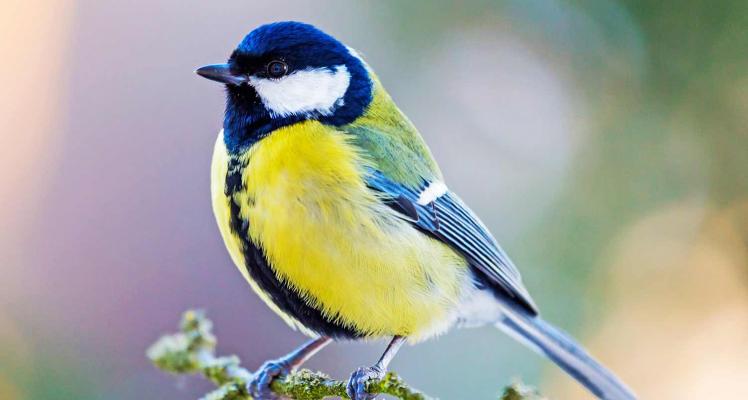Feed the birds, this Winter
2nd December 2020
Survival for birds can be challenging at any time of year, but in particular during the cold winter months. Small birds especially struggle due to having a large surface area and comparably small volume. This means they lose heat to their surroundings very quickly and must eat a lot of food to replace the energy lost. Many of us want to help them out but aren't sure what to feed birds in winter, which doesn't need to be the case.
The ground during winter is too hard for birds to dig for worms, and caterpillars, aphids, beetles and grubs stay well-hidden, hibernating in thick vegetation. These factors combined with the limited hours of light in which birds can actively search for food can cause them to be very vulnerable during winter.
But with a little helping hand from us, many more birds can survive the cold. The following are a few of the best types of food to leave out in order to assist our feathered friends and can be placed upon feeding tables, inside hanging feeders or scattered at ground level. Read on to discover the different types of food we can feed birds in winter.
Sunflower Seeds
These are rich in necessary protein and unsaturated fats. Black sunflower seeds are better to use than striped sunflower seeds due to their higher oil content. Sunflower hearts and crushed seeds are great in winter as the birds do not need to waste energy removing the husks, with the added benefit of leaving less mess behind. Both tits and greenfinches are known to favour these seeds. The great thing about these is that they are easy to grow at home to provide good stock.
Nyjer Seeds
These are very small, black seeds which are rich in fat and oil. Due to their size, they will most likely fall straight through a standard feeder and will, therefore, need to be mixed with other seeds in a plastic feeder. Alternatively, a special nyjer feeder can be bought or the seeds placed on a tray raised off the ground. These seeds are a favourite of goldfinches and siskins.
Peanuts
Salted or dry roasted peanuts should not be used as they may harm birds. Only use peanuts that are fresh and sold for human consumption, or that is from a reputable feed shop, as some can contain high levels of a natural toxin that can be lethal to birds. Peanuts are rich in fat and protein and are popular with tits, greenfinches, house sparrows, nuthatches, woodpeckers and siskins. When crushed or grated they will also attract robins, dunnocks and occasionally wrens. These are also possible to grow at home, but you need to create a good warm climate during the summer months.
Fruit
Fruits such as apples, pears and plums make great bird food due to their high water content and being energy-rich with simple sugars. These can be halved and left on either the bird table or on the ground and will be enjoyed by robins, blackbirds, thrushes and waxwings.
Fat Balls
Fat-based foods are perfect for providing birds with protein and carbohydrates in winter and can come in ball, bar or cake form. If buying from a store, ensure the nylon mesh casing is removed as it can trap and injure birds. For a simple home-made version, melted suet or lard can be poured on to a mixture of seeds, nuts, dried fruit, oatmeal and cheese. The mixture should contain two-thirds of ingredients to one-third of fat. Stir them together thoroughly, then pour the mixture into a container and allow it to set. The chosen container can also be used as a feeder or the solid mixture can be turned out on to a bird table. This will provide a great boost in calories to a wide range of species.
Bread Crumbs, Cheese, Rice & Cereals
Leftover materials can be a welcome contribution to any bird during winter, so put out some bread crumbs and grated cheese to give additional protein to the birds. Cooked rice, white or brown, is readily accepted by many birds during the more severe weather and can be very beneficial to them. Uncooked rice may be eaten by pigeons, doves and pheasants. Porridge oats can be used but must never be cooked as the mixture could solidify around a bird’s beak. Any types of cereals are also suitable but are best used in small quantities, with a supply of drinking water nearby.
Water
It is essential for birds to have access to a clean, fresh supply of water for drinking and cleaning in. This can be created with a birdbath or even a shallow dish filled with water and raised off the ground. To avoid the water freezing in winter, place a small plastic ball on the surface and the movement in the wind will prevent it from freezing.
Hygiene
Many birds die each year due to the transmission of diseases. To prevent further transmission, clean all feeders weekly and water containers daily, drying them thoroughly afterwards. Rotating the areas in which they are placed can also reduce the risk of disease. Make sure you use a product that is safe for birds and not a normal household cleaner.
There are many other ways in which we can assist birds in the winter and throughout the year, even if it is just allowing the borders of your garden to build up with leaves. Although it may look dishevelled, it will provide necessary hidden sustenance for many birds.
(Article courtesy of https://www.lovethegarden.com/ - Find out more from the Evergreen website)
